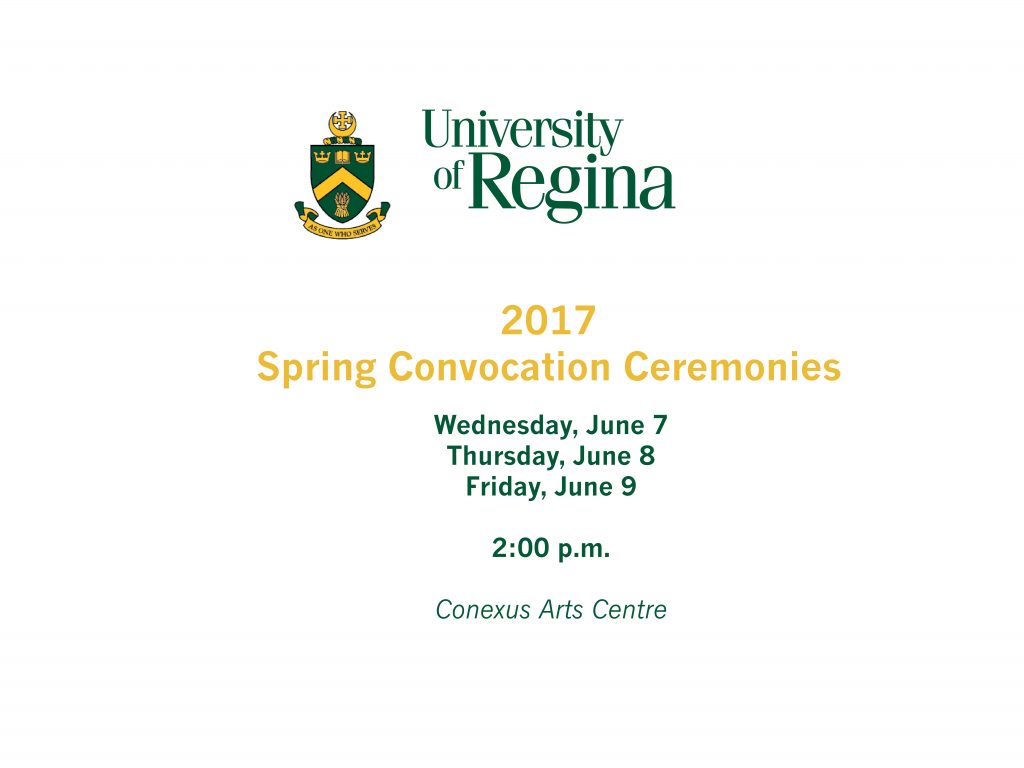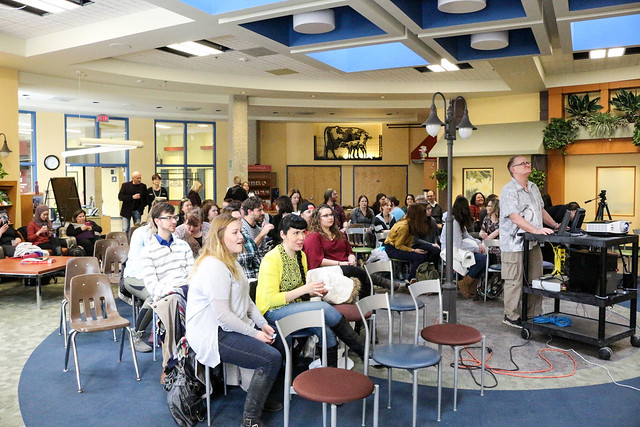Author: Editor Ed News
Spring 2017 Convocation Dates
Theory and Method Seminar | Jennifer Mascall
Enseignants en français: la nouvelle génération
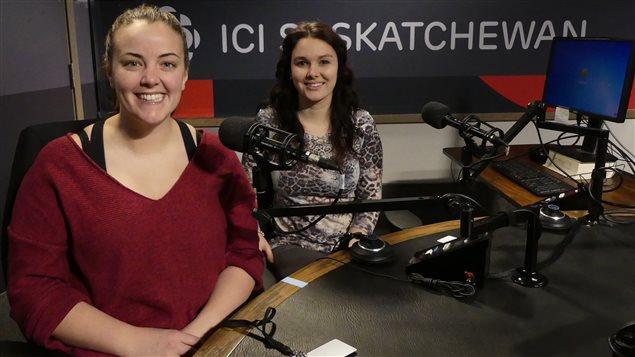
Two new graduates of the Bac program are interviewed on Radio-Canada
What are the challenges of future teachers of French in the province? The Daybreak team invites you to discover the journey of two new graduates of the University of Regina who will teach French in primary and secondary levels in the next few months.
Qui sont ces jeunes qui enseigneront le français langue seconde à nos enfants en Saskatchewan? Quels sont leurs parcours et leurs aspirations?
Pour mieux connaître ces jeunes enseignants qui dirigeront bientôt les leçons de français dans nos écoles, nous avons rencontré 4 futurs diplômés de l’Université de Regina.
Ce matin, écoutez la première entrevue avec deux d’entre eux, Mallory Horn et Kya Kokott, au micro de Point du jour
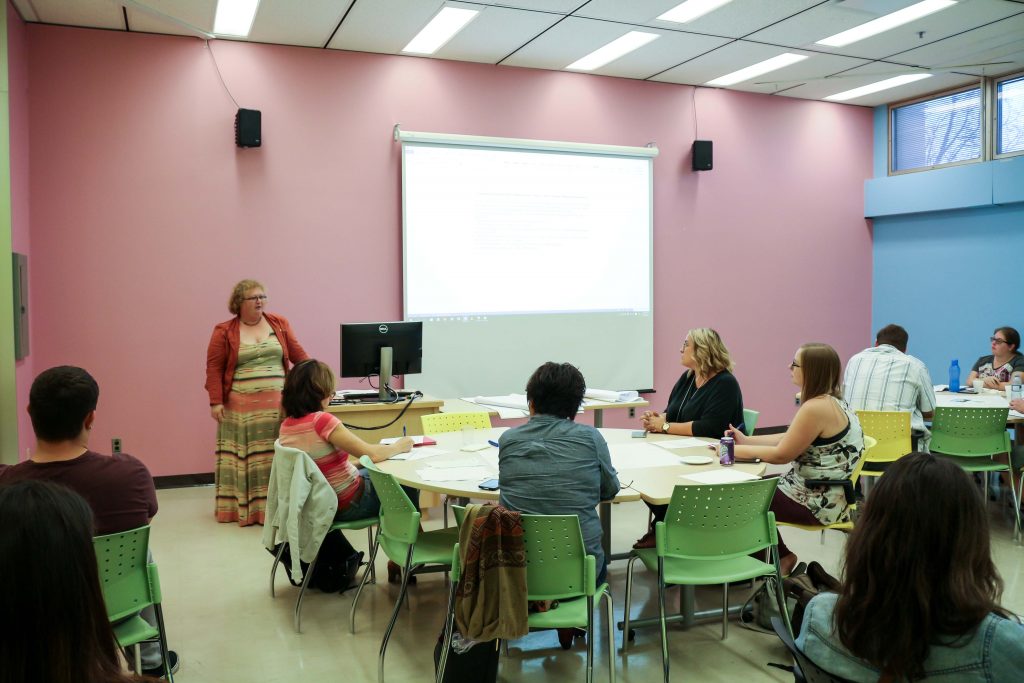
Supporting the achievements of Aboriginal students in numeracy
In late December of 2016, Dr. Gale Russell was invited by the Student Achievement Support Unit within the Manitoba Ministry of Education to attend their second Mamtowisiwin session that was focused on supporting the achievement of Aboriginal students in the area of numeracy. By the end of an hour-long conversation with members of the unit, the invitation had extended from presenting on the first day of the two-day event, to offering a two-day workshop.
Gale accepted and presented a workshop on February 8 and 9, 2017. In attendance were over 140 school division directors, mathematics consultants/superintendents, Aboriginal consultants/superintendents, Manitoba Ministry of Education personnel, principals, vice principals, teachers, and preservice teachers.
Gale says, “It was a great two days, filled with lots of exploration and discussion of diverse, yet interconnected topics including: mathematics – what it is, what it could be, and what it should be; the Traditional Western and an Indigenous worldview, supporting Aboriginal students in mathematics, supporting all students in mathematics, and how to ‘deal with’ systemic factors beyond their control (such as standardized testing and grading policies. It was a time of seriousness, laughter, and even tears. And, everyone did their homework – both reading articles and counting squares. It was also a great pleasure to meet and work with the invited Elder for the two days, Florence Paynter, a retired educator and scholar, who shared many stories and much wisdom with the group.”
Since the workshop, Gale has been regularly receiving emails from attendees with specific and general questions, as well as an invitation to come and spend the day with the Manitoba Association of Mathematics Teachers on their PD day in October. Gale says, “I have happily accepted the invitation, and look forward to yet another experience of deep insights, thought-provoking discussions, and lessons to be learned, challenged, and unlearned.”
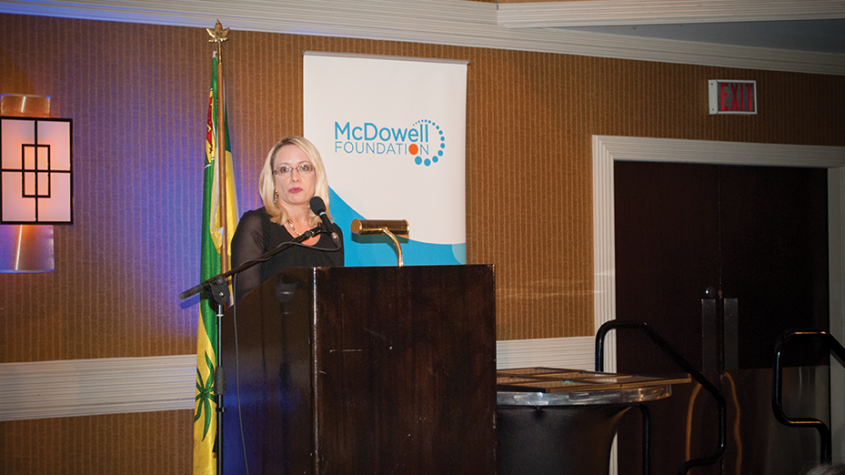
Tupper stresses importance of McDowell Foundation in current climate
In her keynote address to the McDowell Foundation’s 25th anniversary gala, Jennifer Tupper, dean of the Faculty of Education at the University of Regina, told those in attendance that the work of the McDowell Foundation, and its support for teacher inquiry and research, is more important than ever.
Tupper expressed her grave concerns for PreK-12 education in Saskatchewan and elsewhere, citing political, social and economic times that leave us with much uncertainty when it comes to the current educational landscape in the province.
“There is less government support for publicly funded education, less respect and support for the important work of teachers, and increasingly complex and diverse classroom realities that teachers must negotiate in good ways every day with fewer resources at their disposal,” Tupper suggested.
While pledging her deep respect for “each one of you in this room for the contributions you are making to the lives of children and youth in the province,” Tupper drew on her personal experience as a McDowell researcher.
“Since 1991 when it was formed, the McDowell Foundation has supported an amazing legacy of teacher-led research with real, immediate and lasting educational effects by funding almost 300 projects.”
According to Tupper, “if we believe, as educators, that our role is to teach for a better world, then the McDowell Foundation is an important avenue of support for this work which can be, as you all know because you live it, very challenging, emotional, frustrating, but that can also be tremendously rewarding and indeed transformational.”
As an academic herself, Tupper shared how research projects at universities can be a painstakingly slow and circuitous process while clinging to the hope that others will ultimately read the published articles at the culmination of the research.
“Sometimes, the time between finishing our research and publishing is up to five years. Sometimes it is years before we have evidence that our research has been taken up by other academics in other universities around the world,” Tupper shared.
Against that backdrop Tupper said it was her aim to highlight the real and immediate value of the teacher-led research funded by the McDowell Foundation.
“This organization, which is relatively unique in Canada, is one that we must all value, support, and continue to advocate for now and in the future, and especially because these are such precarious times.
“The McDowell Foundation is about research that has an impact. Your commitment to transforming Saskatchewan classrooms and teaching for a better world is where hope resides in this post-truth and precarious world we find ourselves in. Together we are stronger.”
Student Success Celebrated
Student Success Celebration Photos (to view slide cursor over the photo and click on the arrow)
The Faculty of Education, along with partners SUNTEP Regina and YNTEP (via Skype), gathered to celebrate student success on March 7, 2017. The organizing committee from the Student Program Centre, Dr. Val Mulholland and Wanneta Martin, invited faculty from SUNTEP, YNTEP, and the Faculty of Education program chairs and student societies to forward names of students who have made contributions to learning and to leadership in the Faculty of Education through scholarship, activism, and engagement in coursework.
Dean Jennifer Tupper brought greetings, reminding students that their successes reflect the motto of our faculty: Inspiring and Transforming Education.
SUNTEP Regina’s new Michif 100 course was celebrated at the event. Coordinator Janice Thompson spoke to the uniqueness of the SUNTEP Regina program, being the first post-secondary institution to offer such a course.
The new Arts Education program exhibited a commemorative piece by artist and second-year student Molly Johnson.
Students listed below were recognized by faculty members or student societies for having made a significant contribution to teaching, learning and/or leadership in their classes, field placements, or in the community.:
Karie Aikman
Regina Akok
Leanne Allen-Bader
Bailey Antonishyn
Amy Arnal
Nicole Aulie
Molly Basnicki
Kimberley Bateman
Jessica Bec
Haylie Bedore
Raquel Bellefleur
Mari-Anne Berriault
Brandon Bezanson
Robert Blenkin
Melayne Borys
Mélissa Bouffard
Curtis Bourassa
Orisha Boychuk
Karlee Brennan
Dori-Lyn Brezinski
Abby Bristow
Taryn Buhler
Sarah Burns
Amy Campbell
Melaynie Campbell
Jolene Campbell
Stefanie Cook
Petina Cook
Kaitlin Corbin
Rose Couture
Shannon Cranch
Annamarie Cressman
Chelsea Croft
Rachel Davis
Samantha Dech
Arnaud Demaria
Diana Demaria
Jillian Dempsey
Austin Denham
Allison Doetzel
Jaicee Draper
Catherine Duffy
Josée Dumont
Robyn Dyck
Jacquelyn Easton
Courtney Einsiedler
Allison Entem
Emily Eskowich
Jordan Ethier
Jaiden Evans
Martin Farrow
Alexandra Fenson
Elise Fettes
Kara Fidelack
Kyla Fidelack
Payden Fraser
Taylor Frei
Dawn Ganshirt
Alicia Garlock
Sally Generoux
Lolery George
Nicole Gerbert
Spencer Giffin
Hillary Gladish
Chloe Golden
Erin Goodpipe
Ashley Grandfield
Todd Greenwood
Brittany Haidt
Jenna Hansen
Tara Hanson
Taylor Harder
Kylie Harder
Allyson Haukeness
Madison Hawkes
Laura Heinmiller
Colin Hickman
Robyn Hilderbrand
Sarah Hoag
April Hoffman
Andrea Hoffman
Courtney Horsman
Victoria Howe
Kaila Huber
Rachel Hussey
Melanie Ilnisky
Benjamin Ironstand
Rachelle Ismond
Celeste Jensen
Venus Kay
Amy Kapeller
Shayla Kapila
Chelsea Driedger
Kalen Kehrig
Beth Kelln
Kourtney Kerelation
Hojeong Kim
Sarah Kirschman
Samantha Kitzul
Amy Klassen
Kristen Klatt
Landen Kleisinger
Shaelyn Knudson
Shaunee Kobialko
David Korchinski
Jasmine Korpan
Brennan Kowalski
Vanessa Kushniruk
Payton Kuster
Rachelle Lamontagne
Brittany Larson
Kendra Leier
Janelle Letkemann
Sharon Lewis
Aleesha Lichtman
Amanda Livingstone
Latasha Luchsinger
Hanna Macaulaly
Tianna Macdonald
Stephanie Maier
Marie Louise Malick
Daylia Martin
Amy Martin
Melissa McCormick
Matthew McKee
Laine McLaren
Liard McMillan
Brigid McNutt
Miranda McPhee
Christopher Merk
Jaylee Michel
Matthew Mickleborough
Renee Molesky
Amanda Moosemay
Harper Morland
Brenna Morris
Renee Muir
Craig Munroe
Kayley Murdoch
Noelle Nestman
Jenna Neufeld
Cole Nicolson
Crystal Norris
Christina Oberlin
Daniel Odendaal
Lexy Osborne
Brandi Ottenbreit
Barbara Owens
Julia Papic
Danielle Pelletier
Leta Perepeluk
Josie Phillips
Jasmine Phillips
Katelyn Pippus
Sarah Pitman
Cassandra Poirier
Sébastien Potvin
Jessica Pouliot
Mackenzie Raedeke
Elio Ramirez
Sarah Redmond
Eve Reed
Jessica Reid
Sara Reimer
Julie Rempel
Zachary Renwick
Ellen Revet
Holly Robinson
Brooke Robson
Kaitlyn Rohrke
Sarah Ross
Jolene Ross
Jenna Rudolph
Sara Salazar
Avery Saunders
Teagan Schiltz
Rina Schmidt
Karley Schwab
Carmelle Seiferling
Kirsten Selinger
Zachary Sellers
Madisson Shearer
Nissa Shiell
Bailie Shindle
Paddra Shing
Laura Simpson
Gillian Smith
Valerie Snider
Karae Sotropa
Alexandra Specht
Jacob Stebner
Peter Steele
Melissa Stephens
Daniel St-Jacques
Paula Stoker
Shelby Stratechuk
Kelsie Sutherland
Michelle Sweeting
Christina Thiel
Debra Townend-Callaghan
Leigh Tremblay
Rhandi Turton
Jessamy Unger
Jayda Van Betuw
David Vanderberg
Leanne Varley
Bryce Voogd
Tiana Waldbauer
Trisha Wallington
Kristen Wallington
Kayla Ward
Timothy Wasyliw
Jessica Weber
Katlyn Weisberg
Raelyn Weisgerber
Corina Wesdyk
Kaitlin Wesnoski
William Whitten
Lacey Wicks
Cameron Wiest
Dana Wilbraham
Tanya Wilkins
Jillana Willford
Benjamin Woolhead
Student Artwork Commemorates Arts Education Program
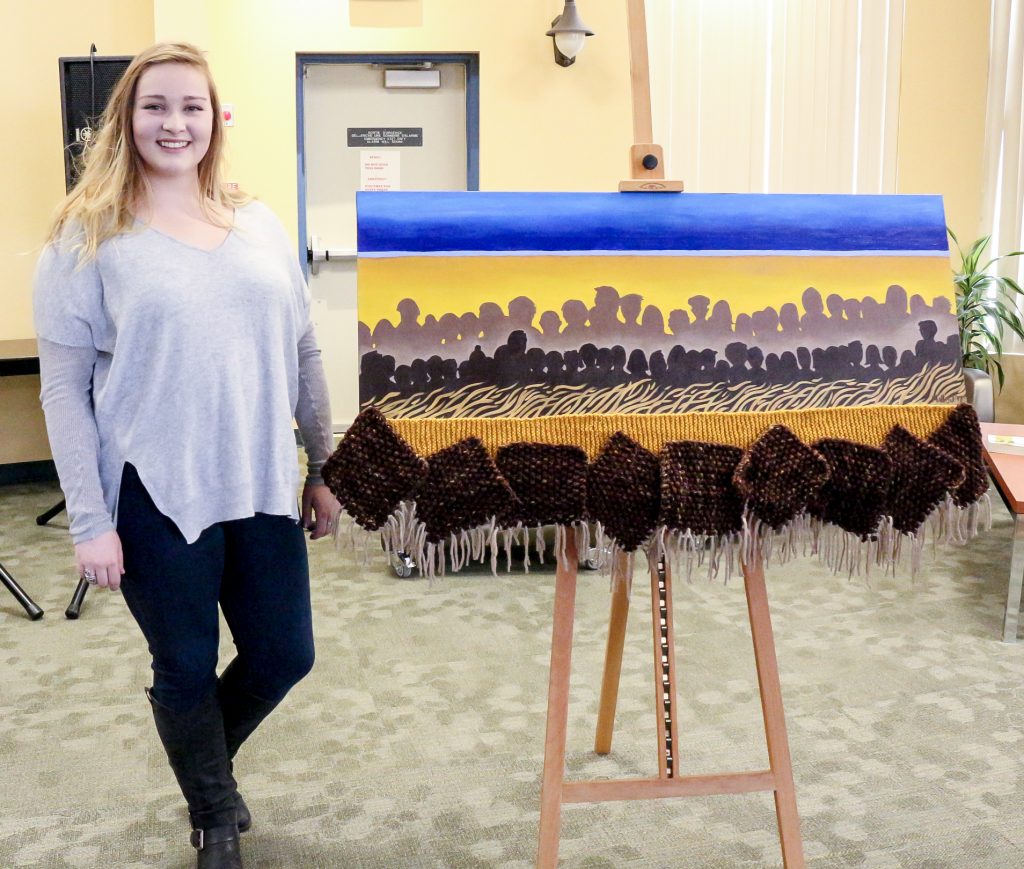
Artist and second-year Arts Education student, Molly Johnson, was commissioned to produce the commemorative piece that will be installed in the Faculty of Education to celebrate the Arts Education program’s 34 successful years in the Faculty of Education and the Fall 2016 introduction of the new Arts Ed program.
Visual Education Chair, Dr. Valerie Triggs says, “The Faculty of Education decided to invite proposals for a work of commemorative art to celebrate the years that the Arts Education program has been in the Faculty and also the transition to the new program. We received many excellent proposals. The selection committee decided to award the commission for this commemorative work of art to Molly Johnson.”
The Faculty also approached the MAP (Media, Arts, and Performance) Faculty, requesting an artist-mentor to work alongside Molly. Dr. Triggs says, “We had the privilege of connecting with a graduate student from MAP, Jennifer Shelly Keturakis.”
On her role as mentor, Jennifer says it was an honour to work with Molly; she is “self-directed, motivated, intelligent and articulate…I had one set of expectations of what my input would be because I made some assumptions based on her being a second year [student], based on my own experience as a second year, but I quickly had to pick a different role.”
Molly’s artwork was exhibited and celebrated on March 7, 2017 at the Student Success Celebration.
To hear Molly’s explanation of her work, view the following video:
New Edited Book on Culturally Responsive Pedagogy
 Culturally Responsive Pedagogy: Working towards Decolonization, Indigeneity and Interculturalism
Culturally Responsive Pedagogy: Working towards Decolonization, Indigeneity and Interculturalism
Edited by Dr. Fatima Pirbhai Illich (University of Regina), Dr. Shauneen Pete (University of Regina), and Dr. Fran Martin (University of Exeter)
Palgrave Macmillan provide the following abstract:
“This book convincingly argues that effective culturally responsive pedagogies require teachers to firstly undertake a critical deconstruction of Self in relation to and with the Other; and secondly, to take into account how power affects the socio-political, cultural and historical contexts in which the education relation takes place. The contributing authors are from a range of diaspora, indigenous, and white mainstream communities, and are united in their desire to challenge the hegemony of Eurocentric education and to create new educational spaces that are more socially and environmentally just. In this venture, the ideal education process is seen to be inherently critical and intercultural, where mainstream and marginalized, colonized and colonizer, indigenous and settler communities work together to decolonize selves, teacher-student relationships, pedagogies, the curriculum and the education system itself. This book will be of great interest and relevance to policy-makers and researchers in the field of education; teacher educators; and pre- and in-service teachers.”
“An important read for educators, administrators and policy makers … a very welcome addition to studies of decolonial education and the poetics and politics of educational futurity” George J. Sefa Dei, Professor of Social Justice Education, University of Toronto, Canada
To pre-order a copy of the book please visit the Palgrave Macmillan Online Store.
In Canada I would check out work/networks of Dr Fatima Pirbhai Illich. On FB not twitter. She is at Uni of Regina. First Nations chs here pic.twitter.com/AeRqDZvqyH
— Diane Leedham (@DiLeed) July 24, 2017
Fatima Pirbhai-Illich opening the “Decolonizing Teacher Education” seminar with verses from the Quran # Exeter University pic.twitter.com/K5Jq5rH81G
— Dr.Maryam Almohammad (@AlmohamadMaryam) Palgrave Macmillan Online Store
SUNTEP First to Offer Michif 100 Language Course
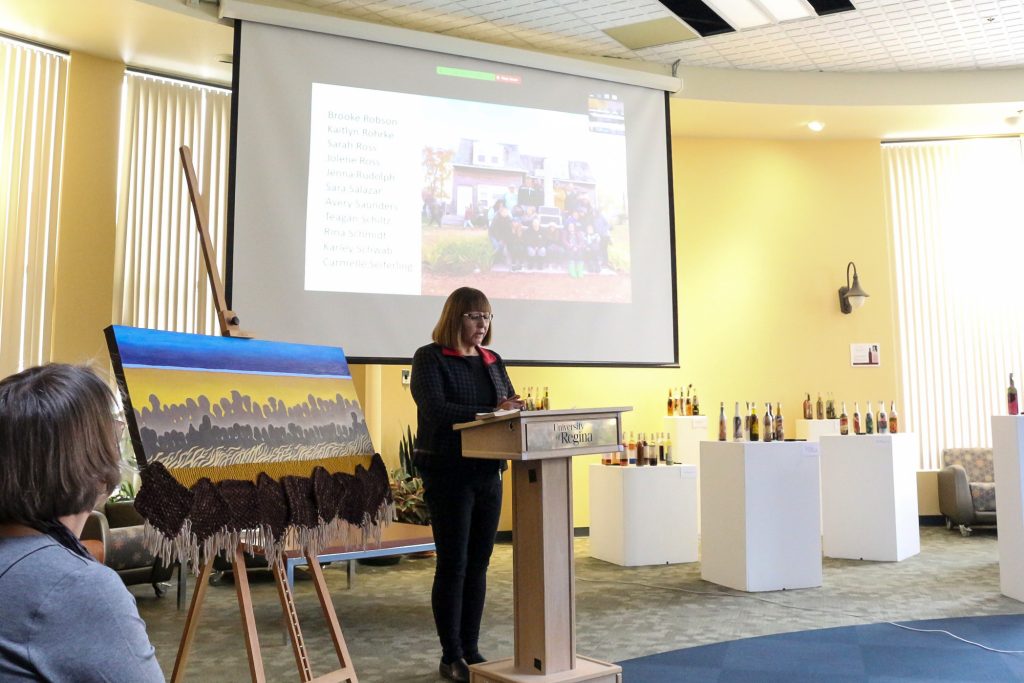
A Michif 100 language course is now being offered to Saskatchewan Urban Native Teacher Education Program (SUNTEP) Regina students. SUNTEP Regina Coordinator Janice Thompson says, “What makes our program unique and distinct is that we are the first post-secondary institution to offer [the Michif] language course.”
Michif is the indigenous language of many Métis. However, “the Michif language which was once common in Métis communities is now considered an endangered language as there are fewer that 1000 people who speak it.”[1]
Thompson says, “Offering the Michif 100 course continues to reaffirm our commitment to Métis people alongside our mission statement: to promote the renewal and development of Métis culture through research, materials development, collection and distribution of those materials and the design, development and delivery of Métis-specific educational programs and services.” The introduction of the new course was celebrated at the Student Success Celebration, held March 7, 2017.
Gabriel Dumont Institute – SUNTEP, in partnership with the University of Regina and University of Saskatchewan, has been offering elementary teacher training for over 35 years and currently boasts 1206 graduates from Regina, Saskatoon, and Prince Albert programs.
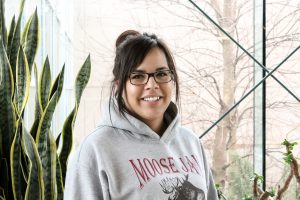
First year SUNTEP Regina student Jenny Veilleux says she feels “fortunate to be one of the first students in Canada to take a Michif class, which is the first one to be offered anywhere ever. Michif is a dying language, with few fluent speakers; it needs to be saved so it can flourish once again. My family was enfranchised in the 1950’s, which unfortunately means they assimilated into the European culture.”
Jenny continues: “Ultimately, they lost most of the languages that they were born to speak during the process. My grandparents spoke between 5-7Indigenous languages and Michif was one. I only grew up hearing phrases or words, never being fully immersed in the language. To be learning Michif now at my age, as an adult, is exciting, but also very difficult. Learning the language of my people is very important to me as it enhances more of what I’m learning about my traditions and culture. This is necessary for many people in Canada, to prevent it from being completely lost.”
